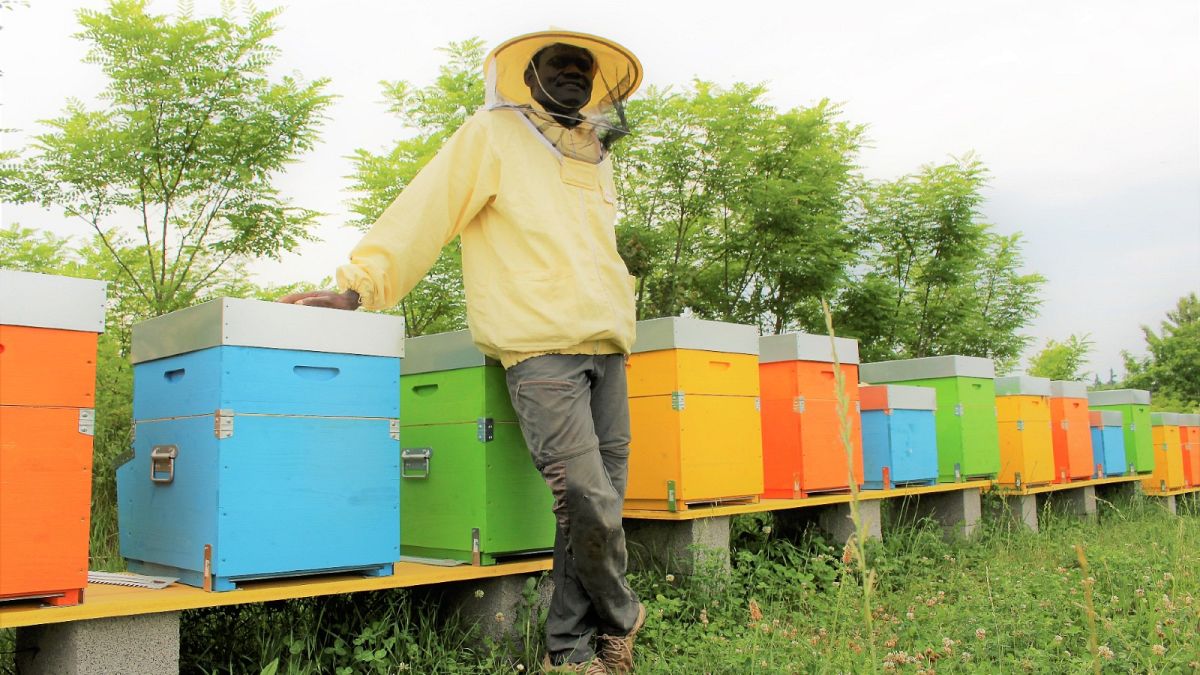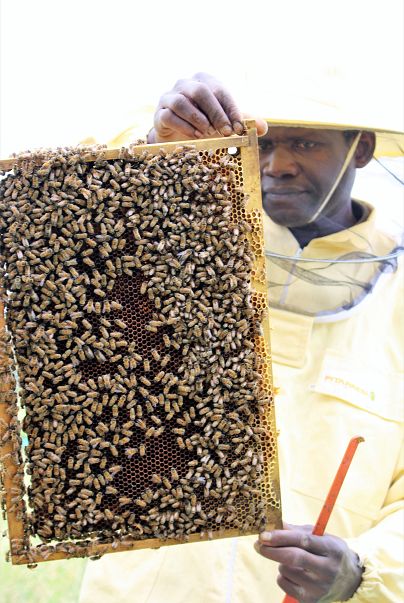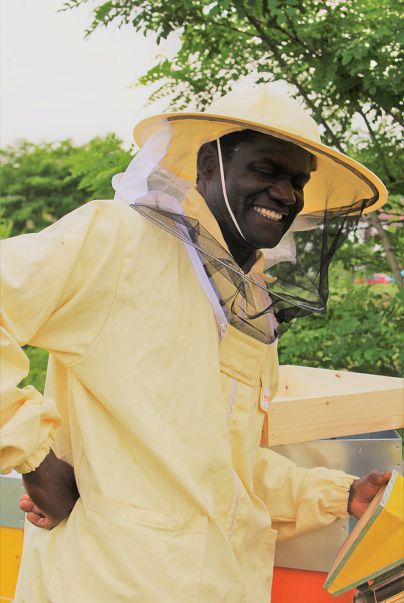Arriving in Italy with next to nothing seven years ago, Abdoul Sane now runs his own small bee farm.
Many of the estimated half a million migrant workers in Italy’s agricultural sector are plagued by low pay and poor working conditions.
Abdoul Sane, however, got lucky.
Arriving at the peak of Europe's migrant crisis in 2015 after a treacherous journey from Senegal, he was saved from exploitation by the Bee My Job programme.
Teaching beekeeping and other skills, the initiative says it's helped hundreds of migrants find sustainable work in the sector.
Seven years on, Abdoul, 32, now runs a small bee farm in the province of Alessandria, Piedmont, north-west Italy, making his own brand Honey of Dreams.
But it could have been much different; Abdoul told Euronews he was sceptical initially by the offer of a beekeeping course.
"I was not convinced. I only knew African bees, very dangerous, I was afraid," he said. "But it was an opportunity and everyone reassured me, telling me that European bees were much less dangerous.
"So I accepted [...] and when I was stung and nothing serious happened to me I realised that a future could open up for me."
'Migrants treated as numbers'
Abdoul's story is in stark contrast to the fate of many undocumented migrants working in Italy’s fields.
They are paid a pittance for gruelling labour and remain excluded from the country's legal and health systems.
There are an estimated half a million migrant workers in Italy's agricultural sector, around half of the total workforce, according to a European Parliament briefing.
Four-in-five of those without contracts in the sector are migrants, says research institute Osservatorio Placido Rizzotto.
New migrant arrivals into Italy get transferred to welcome centres around the country. But Mara Alacqua, the president of Cambalache which runs the Bee My Job scheme, says these vast, impersonal shelters are not providing a solution.
“Often the migrants are not treated as people but just as numbers,” Mara told Euronews.
Her organisation began to provide smaller-scale housing options for migrants where they could get individual help, psychological counselling and learn skills to lead to future employment.
Mara established the Bee My Job initiative as a way to give migrants a foot in the door of the world of work.
“Most of our migrants are from Africa, where bees are much more aggressive,” she said. “So most of them are really scared the first time they have to work with the bees here!”
The eight-month project provides participants with two months of lessons and a four- to six-month internship on a bee farm. During the teaching period, migrants learn the art of beekeeping as well as transferable skills like the Italian language and workplace safety.
“We ask the farms and the companies that want to participate in the project to sign an agreement to respect people, maintain regular payment and assist the learning process of the employees,” she said. “The agricultural sector is really big and lacks controls on employment and how workers are treated."
Many of the scheme's participants go on to find jobs in bee farms or other agricultural activities and Mara says many companies call each year to request more migrant workers. A couple of participants, including Abdoul, have even managed to set up on their own.
Alongside assisting migrants to find legal and economic stability, the project is bolstering a struggling industry. Italy’s beekeeping sector is in need of workers and is facing threats from honey production in Eastern Europe and China.
'My skin was burned by the sun and gasoline'
Abdoul says he fled Senegal due to political tensions in the region, intending to go to Mali initially.
"But there were no opportunities and on the advice of some Gambian guys that I met, I decided to go to Libya - a place I knew nothing about, except that I would have to cross the desert.
"In Libya it was terrible, I stayed for several months, I lived in a kind of prison, where the local gangs made you pay for a place to sleep.
"Until one night, I was able to leave by sea, I knew nothing of where I would go, nor of when the journey would be dangerous.
"I arrived in Italy, with my skin burned by the sun and gasoline. after landing in Sicily, shortly after I was transferred to Piedmont."
Leaving Senegal in a rush, he arrived in his new country without documents or a plan for the future.
He found out about Bee My Job after meeting Mara.
"In Senegal, I was an electrician, I worked with solar panels, and I hoped to be able to continue in that sector, or at least work as a welder. Instead, Mara told me about the beekeeping course."
Now a successful entrepreneur, he wants to bring his wife and children to Italy, as well as help grow beekeeping back in Senegal.
"Bee My Job and the path with Cambalache has given me many tools to build my future. I am working to develop beekeeping in my country. I have already taught some techniques to my brothers who live in Casamance, who have started producing honey. And I would like to help many other people to start working in this beautiful sector."
Every weekday, Uncovering Europe brings you a European story that goes beyond the headlines. Download the Euronews app to get a daily alert for this and other breaking news notifications. It's available on Apple and Android devices


